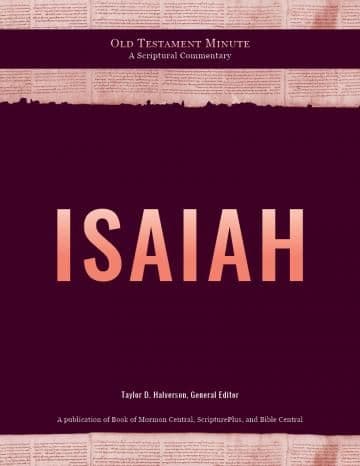Book
66 Chapters

Isaiah 32
This prophecy deals with a king who “will reign in righteousness.” Many scholars propose that this prophecy pertains to Hezekiah, a king who “did that which was right in the sight of the Lord. . . . He trusted in the Lord God of Israel. . . . He clave to the Lord, and departed not from following him” (2 Kings 18:3, 5–6). But if Hezekiah was the contemporary fulfillment, then the Lord Jesus Christ is the greater fulfillment of this prophecy. The Latter-day Saint Bible chapter heading reads “A king (the Messiah) will reign in righteousness.”
refuge/shelter/streams/shade. Isaiah produces four symbols to demonstrate the positive aspects of righteous rulers and their sovereign work: “Each will be like a refuge from the wind,” “a shelter from a tempest,” “streams of water in a dry place,” and the “shade of a great cliff.” These symbols speak of both physical and spiritual blessings to citizens of the kingdom.
eyes/ears/heart/tongue. Isaiah uses four body parts to demonstrate the blessings that will come to subjects of a righteous king—magnified and enlightened abilities to see, hear, “understand knowledge,” and communicate. These blessings may have temporal applications, but they certainly have spiritual relevance.
wickednesses. The Hebrew word used here is generally found in the singular, but Isaiah uses the plural (ra‘im) to emphasize the great wickedness.
When a king rules in righteousness, wicked persons will no longer be viewed as noble or honorable but will be recognized for what they are. The folly of the fool will be manifest, the worker of ungodliness will come to light, and the person who “devises wickednesses” will be known.
Isaiah continues to prophesy in the context of Assyria’s imminent war with Judah. This section consists of three parts: (1) The Lord warns His people, in this case Judah, that troubles are coming—“the vintage will fail, the harvest will not come . . . the palace will be forsaken, the noisy city abandoned” (32:9–14). (2) Isaiah prophesies that God’s Spirit, in a future day, will be “poured out upon us” and bring great blessings (32:15–17). (3) The Lord addresses His people again and promises them that the time will come when they “will live in a peaceful habitation, in secure dwellings” (32:18–20).
Women who are at ease (compare also 2 Nephi 28:20–29). Or, complacent. The Lord utters a series of commands: “tremble,” “quake,” “strip and make yourselves bare” (remove your jewelry and fine ornaments so that you can gird sackcloth and beat your breasts in mourning). Why? Because difficult times are imminent, so difficult that the grape and wine industry will fail and the “harvest will not come,” meaning, the kingdom will lack food. In fact, the soil will not be cultivated for a period of time, such that weeds, “thorn and briar will come up.”
citadel and watchtower. “Citadel” literally reads “Ophel,” which was an area of Jerusalem that included a portion of the old city of David and Solomon’s temple.
Until the Spirit. Isaiah refers to the Holy Ghost. The word until is pivotal: Judah will experience calamity “until” the Lord’s Spirit is poured out, and then things will change.
The Holy Ghost brings forth great blessings: the wilderness will become a “fruitful field,” and “justice,” “righteousness,” “peace,” “quietness,” “security,” and other gifts of the Spirit will exist and be magnified.
fruitful field (compare also 29:17). Mentioned three times, the fruitful field speaks of literal fertile and high-yielding crops and produce. But “fruitful field” also refers to spiritually productive people.
The Lord promises that His covenant people will live in “peaceful” and “secure dwellings.” And though there may be destructive forces (such as “hail”), God’s covenant people will be “happy” (see also Joel 2:28–29; Joseph Smith—History 1:41; Doctrine and Covenants 95:4).
The verse presents difficult forms, which makes a proper translation complicated.
Happy, you who sow. A reversal of the failing harvest and the proliferation of thorns and briars, mentioned earlier in the section (32:10, 13).
Book
66 Chapters
Items in the BMC Archive are made publicly available for non-commercial, private use. Inclusion within the BMC Archive does not imply endorsement. Items do not represent the official views of The Church of Jesus Christ of Latter-day Saints or of Book of Mormon Central.